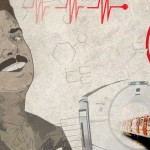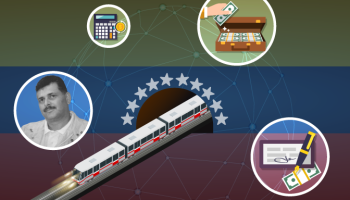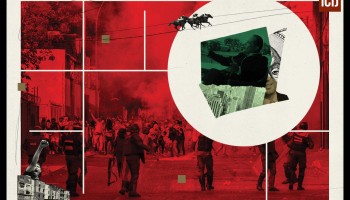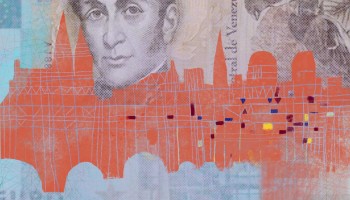From May to September last year, the Caracas Metro let everybody ride free, every day. That’s more than 2 million passengers daily.
The freebie was not the result of a government policy to boost public transport, nor a marketing gimmick to increase passenger volume. The rides were free because the state company that runs the system ran out of paper to print the tickets, a situation that took months to rectify.
Venezuela’s inability to import paper or to make its own were direct outgrowths of its dire financial situation. In 2018, the country’s access to foreign currencies and markets was hampered by a state-controlled exchange rate, uncontrollable inflation, and devaluation of the bolivar.
When the Caracas Metro opened in 1983, it was modern, efficient, clean, and a source of pride for millions of “Caraqueños,” as the city’s residents are known. Now, the dramatic economic crisis that has engulfed the country has engulfed the subway as well.
Transparencia Venezuela — the local chapter of the global non-governmental organization Transparency International — has investigated the condition of public transport over the past decade and has released several reports.
According to the organization, electricity and air conditioning in the metro fail frequently, and 85 percent of its 356 escalators are broken. The number of working trains is dropping due to a variety of problems, including inexperienced operators and the inability to import needed spare parts.
In December, a retired metro worker told media that the metro system has collapsed. There is no maintenance being done on the railway, the trains and electrical equipment, he said. As a result, more than half of the trains are no longer in operation.
Decades of Decay Led to Crisis
In November 2006, then-President Hugo Chávez noted that between 1983 and 1998, the year before he took office, only 40 kilometers of metro track had been built. He vowed that, “with what we have already built, and what we are starting to build ... by the end of 2011 … we will have built 86 kilometers of Metro.”
This didn’t happen.
According to Transparencia Venezuela, many of the projects launched more than a decade ago have ground to a halt, while just a few small new segments of the lines have been opened. A number of the contracts were awarded to Odebrecht, a Brazilian infrastructure firm embroiled in a major international corruption scandal that, according to US court documents, gave more than US$ 98 million in bribes to Venezuelan officers and intermediaries.
Transparencia Venezuela published an investigation in May into each major Odebrecht contract in the country. Work on Line 2 of the metro, which began in 2007 and was supposed to be completed in 2012, has stopped dead: One sector is about 77 percent done, while a second is just over 38 percent completed.
Similar delays plague Line 5, which was begun in 2007 with a finish date of 2011. Completion was first delayed to 2015 and is now projected for 2020. The work is only 62 percent done and is currently stopped. The Caracas-Guareas-Guatire line, also begun in 2007, was slated to be finished in 2013; that has now been shifted to 2019. Only 27 percent has been completed.
In 2017, the opposition-controlled National Assembly issued a study of Metro contracts that found cost overruns of 1,200 percent on Line 5 projects and 744 percent on the Caracas-Guareas-Guatire line.
As reported by El Pitazo, María José Araque, a spokeswoman for Odebrecht in Venezuela, says the work is only carried out when funds are released by the client — in this case, the government of Venezuela.
Caracas Metro, on the other hand, filed a lawsuit against Odebrecht in December 2017 for failing to finish 11 large-scale projects, the first legal action of the kind by a public entity in the country, according to Transparencia Venezuela.
Construction Rate Slowed Over Past 20 Years
Transparencia Venezuela says that between 1979 and 1998, 40 stations were built. But between 1998 and 2018 – during the presidencies of the late Hugo Chávez and current President Nicolas Maduro — only nine new stations have opened.
The metro’s construction rate has fallen from 2.24 to 0.68 kilometers per year.
Luis Manuel Aguana is a former technology manager of the Caracas metro and a member of Familia Metro, a non-governmental organization that specializes in the public transport system. He told the El Nacional newspaper that “technical staff trained over years and with long experience retired from the [state Metro] company and new generations are not well trained. Metro management abandoned preventive care and forgot that the [Metro] does not generate its own income, which is why many companies will not supply spare parts. When they want to pay, they have no funds.”
According to the Caracas Metro union, more than 1,500 workers have left Venezuela, the website Cronica Uno reported last August. They’re part of a larger exodus from the country; the United Nations estimates that 3 million people (over 9 percent of the population) have fled, mainly because of food shortages. The outflow has left many sectors without skilled labor.
Even the Maduro administration agrees that the Metro is in crisis. Although Transportation Minister Hipolito Abreu blames “the economic blockade” for difficulty in sourcing new parts, he said in an interview with public television Televen that “the public transport [system] must go through a total revision of its operation and functionality.”
Nevertheless, the Metro’s anniversary is celebrated each year on Aug. 8. On that date last year, passengers sent angry letters to newspapers and vented on social networks.
In a radio interview last August, Ramon Gonzalez, president of the Caracas Metro Users’ Committee, said he didn’t feel like celebrating.
“The metro is no longer ‘the great solution,’ it has become the great chaos for the people of Caracas,” he said during the period of free ridership. “The turnstiles are free, the fares are not charged, there is little lighting in the stations, some of the escalators are paralyzed ... They destroyed the Metro. ... [Earlier we] proudly felt we had the best subway in the world.”






